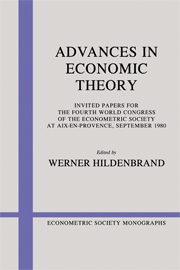Book contents
- Frontmatter
- Part I Economics of incentives
- Chapter 1 On theories of incentive compatible choice with compensation
- Chapter 2 The theory of incentives: an overview
- Part II Information and the market mechanism
- Part III Non-Walrasian economics
- Part IV Repeated games
- Part V Topics in competitive analysis
- Part VI Applied macroeconomics
- Part VI Industrial organization
Chapter 1 - On theories of incentive compatible choice with compensation
from Part I - Economics of incentives
Published online by Cambridge University Press: 05 January 2013
- Frontmatter
- Part I Economics of incentives
- Chapter 1 On theories of incentive compatible choice with compensation
- Chapter 2 The theory of incentives: an overview
- Part II Information and the market mechanism
- Part III Non-Walrasian economics
- Part IV Repeated games
- Part V Topics in competitive analysis
- Part VI Applied macroeconomics
- Part VI Industrial organization
Summary
Introduction
The issue of incentives is one of the grand themes of economics; it is a main thread on which the rich tapestry of economic theory is woven. Notions of self-interested behavior are at the foundation of all microeconomics or theories of individual agents' behavior. Until quite recently, however, most investigations have been concerned with analyzing self-interested behavior under market institutions, as for example, in consumer theory or the theory of the firm.
An early exception to the focus on incentives in a market context was the famous debate in the early years of this century over the feasibility of market socialism - known as the socialist controversy. Here, the issue of incentives arose in a new form - namely, given a specified procedure or rules for allocating resources and making economic decisions in a socialist state, will the agents, in fact, have any incentive to behave as specified by the procedure or in accordance with the rules?
More recently, this question has been posed and analyzed in a variety of models arising from different literature - some models have been very general while others have been very specific. Two main branches in this new, growing field are the theory of economic mechanisms - an outgrowth and development of the theory of socialist and other planning - and social choice theory. However, in both these branches, interestingly enough, the problem of incentives was not one of the first issues explored - although it was raised early by some. In the social choice literature, although the question of honest voting was raised by Vickrey (1960), nearly twenty years passed after Arrow's original work, c.f. Arrow (1963, 2nd ed.), before the contributions of Farquharson (1969), Gibbard (1973), and Satterthwaite (1975) on strategic voting and straightforward or nonmanipulability of social choice rules.
- Type
- Chapter
- Information
- Advances in Economic Theory , pp. 1 - 30Publisher: Cambridge University PressPrint publication year: 1983
- 3
- Cited by

